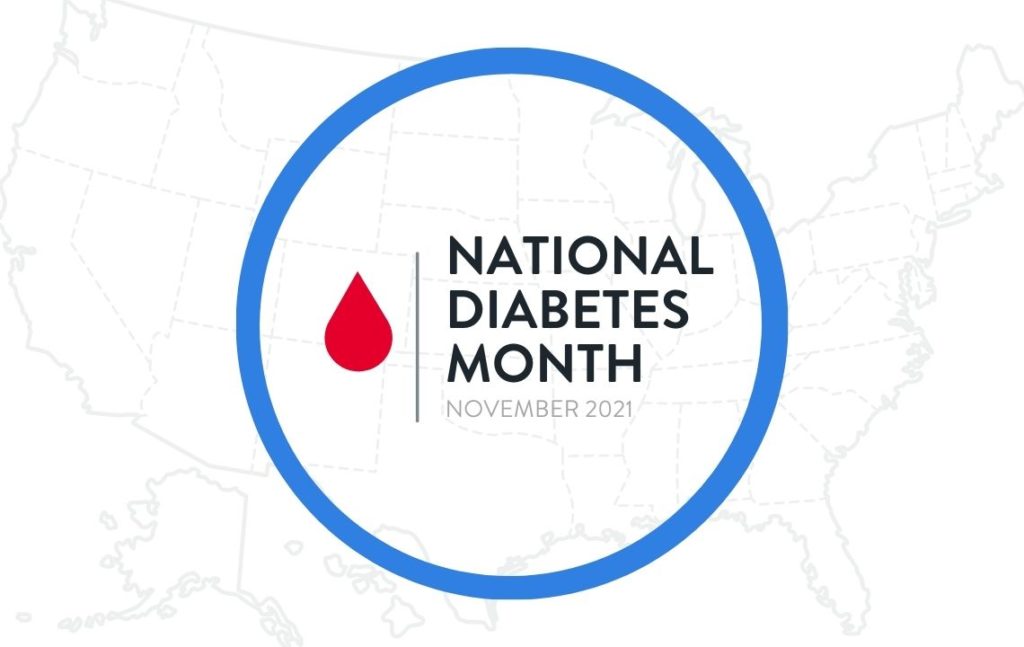Learn about National Diabetes Month
November is National Diabetes Month, a time when communities across the country team up to bring attention to diabetes. This year’s focus is on prediabetes and preventing diabetes.

Prediabetes means you have a higher than normal blood sugar level. It’s not high enough to be considered Type 2 diabetes yet, but without lifestyle changes, adults and children with prediabetes are more likely to develop Type 2 diabetes.
What can you do to help manage and/or prevent prediabetes?
- Take small steps. Making changes to your lifestyle and daily habits can be hard, but you don’t have to change everything at once. It is okay to start small. Remember that setbacks are normal and do not mean you have failed — the key is to get back on track as soon as you can.
- Move more. Limit time spent sitting and try to get at least 30 minutes of physical activity, 5 days a week. Start slowly by breaking it up throughout the day.
- Choose healthier foods and drinks most of the time. Pick foods that are high in fiber and low in fat and sugar. Build a plate that includes a balance of vegetables, protein, and carbohydrates. Eat a variety of foods to help you achieve your goals without compromising taste or nutrition. Drink water instead of sweetened drinks.
- Lose excess weight. If you’re overweight, losing just 5% to 7% of your bodyweight — about 14 pounds (6.4 kilograms) if you weigh 200 pounds (91 kilograms) — can reduce the risk of Type 2 diabetes. To keep your weight in a healthy range, focus on permanent changes to your eating and exercise habits.
- Stop smoking. Smoking may up your risk of developing Type 2 diabetes.
- Seek support. It is possible to reverse prediabetes. Making a plan, tracking your progress, and getting support from your health care professional and loved ones can help you make the necessary lifestyle changes.
- Take medications as needed. If you’re at high risk of diabetes, your doctor might recommend metformin (Glumetza, others). Medications to control cholesterol and high blood pressure might also be prescribed.
- Stay up to date on vaccinations. The COVID-19 (booster shot, if eligible) and flu vaccines are especially important for people who may be more likely to get very sick from COVID-19 or the flu, such as people with diabetes.
For more information, check out these books at your local EVPL location:
- Prediabetes: A Complete Guide by Jill Weisenberger
- The Diabetes Code by Dr. Jason Fung
- The Everything Pre-Diabetes Cookbook by Gretchen Scalpi
- The Prediabetes Diet Plan by Hillary Wright
- Eat What You Love, Love What You Eat, With Diabetes by Michelle May
Resources
- National Institute of Diabetes and Digestive and Kidney Diseases: National Diabetes Month 2021
- Mayo Clinic: Prediabetes
- Hobbies & Crafts Reference Center Database: Search for Diabetes-friendly recipes and more
Have a great November. Here’s to your health!

Michelle H.
With 8 locations throughout Vanderburgh County, EVPL is ready to discover, explore, and connect WITH you! We encourage you to uncover new things, revisit old favorites, and to engage with us along the way.
200 SE Martin Luther King Jr. Blvd
Evansville, Indiana 47713
Administration: ceo@evpl.org
Card & Account: circulation@evpl.org
Feedback & Ideas: marketing@evpl.org



